General_Principles_of_Civil_Law_of_the_People's_Republic_of_China-民法通则
- 格式:pdf
- 大小:400.83 KB
- 文档页数:35
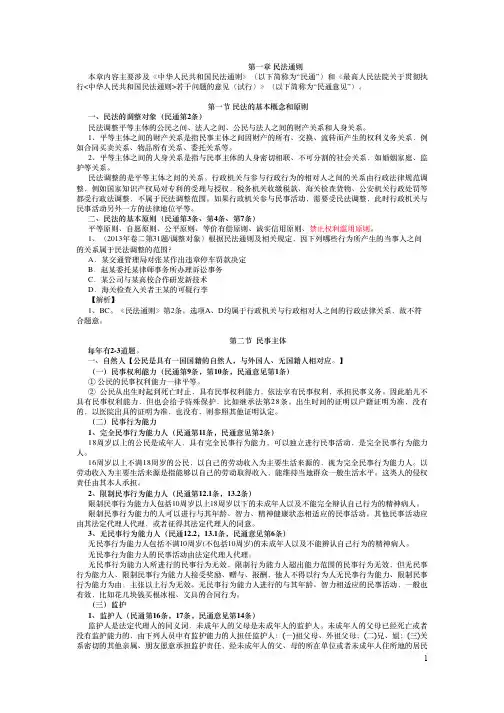
第⼀一章民法通则本章内容主要涉及《中华⼈人民共和国民法通则》(以下简称为“民通”)和《最⾼高⼈人民法院关于贯彻执⾏行<中华⼈人民共和国民法通则>若⼲干问题的意见(试⾏行)》(以下简称为“民通意见”)。
第⼀一节民法的基本概念和原则⼀一、民法的调整对象(民通第2条)民法调整平等主体的公民之间、法⼈人之间、公民与法⼈人之间的财产关系和⼈人⾝身关系。
1、平等主体之间的财产关系是指民事主体之间因财产的所有、交换、流转⽽而产⽣生的权利义务关系,例如合同买卖关系、物品所有关系、委托关系等。
2、平等主体之间的⼈人⾝身关系是指与民事主体的⼈人⾝身密切相联、不可分割的社会关系,如婚姻家庭、监护等关系。
民法调整的是平等主体之间的关系。
⾏行政机关与参与⾏行政⾏行为的相对⼈人之间的关系由⾏行政法律规范调整,例如国家知识产权局对专利的受理与授权,税务机关收缴税款、海关检查货物、公安机关⾏行政处罚等都受⾏行政法调整,不属于民法调整范围。
如果⾏行政机关参与民事活动,需要受民法调整,此时⾏行政机关与民事活动另外⼀一⽅方的法律地位平等。
⼆二、民法的基本原则(民通第3条、第4条、第7条)平等原则、⾃自愿原则、公平原则、等价有偿原则、诚实信⽤用原则、禁⽌止权利滥⽤用原则。
1、(2013年卷⼆二第31题/调整对象)根据民法通则及相关规定,因下列哪些⾏行为所产⽣生的当事⼈人之间的关系属于民法调整的范围?A.某交通管理局对张某作出违章停车罚款决定B.赵某委托某律师事务所办理诉讼事务C.某公司与某⾼高校合作研发新技术D.海关检查⼊入关者王某的可疑⾏行李【解析】1、BC。
《民法通则》第2条。
选项A、D均属于⾏行政机关与⾏行政相对⼈人之间的⾏行政法律关系,故不符合题意。
第⼆二节民事主体每年有2-3道题。
⼀一、⾃自然⼈人【公民是具有⼀一国国籍的⾃自然⼈人,与外国⼈人、⽆无国籍⼈人相对应。
】(⼀一)民事权利能⼒力(民通第9条,第10条,民通意见第1条)①公民的民事权利能⼒力⼀一律平等。
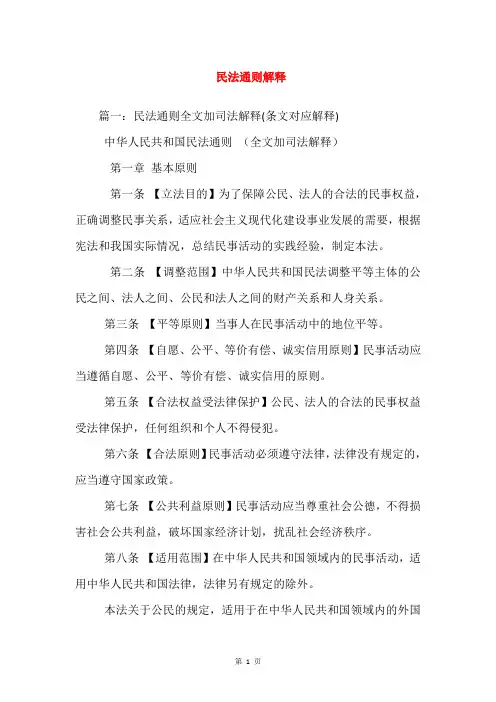
民法通则解释篇一:民法通则全文加司法解释(条文对应解释)中华人民共和国民法通则(全文加司法解释)第一章基本原则第一条【立法目的】为了保障公民、法人的合法的民事权益,正确调整民事关系,适应社会主义现代化建设事业发展的需要,根据宪法和我国实际情况,总结民事活动的实践经验,制定本法。
第二条【调整范围】中华人民共和国民法调整平等主体的公民之间、法人之间、公民和法人之间的财产关系和人身关系。
第三条【平等原则】当事人在民事活动中的地位平等。
第四条【自愿、公平、等价有偿、诚实信用原则】民事活动应当遵循自愿、公平、等价有偿、诚实信用的原则。
第五条【合法权益受法律保护】公民、法人的合法的民事权益受法律保护,任何组织和个人不得侵犯。
第六条【合法原则】民事活动必须遵守法律,法律没有规定的,应当遵守国家政策。
第七条【公共利益原则】民事活动应当尊重社会公德,不得损害社会公共利益,破坏国家经济计划,扰乱社会经济秩序。
第八条【适用范围】在中华人民共和国领域内的民事活动,适用中华人民共和国法律,法律另有规定的除外。
本法关于公民的规定,适用于在中华人民共和国领域内的外国人、无国籍人,法律另有规定的除外。
第二章公民(自然人)第一节民事权利能力和民事行为能力第九条【公民权利能力】公民从出生时起到死亡时止,具有民事权利能力,依法享有民事权利,承担民事义务。
《最高人民法院关于贯彻执行则>若干问题的意见》1.公民的民事权利能力自出生时开始。
出生的时间以户籍证明为准;没有户籍证明的,以医院出具的出生证明为准。
没有医院证明的,参照其他有关证明认定。
第十条【权利能力一律平等】公民的民事权利能力一律平等。
第十一条【完全民事行为能力人】十八周岁以上的公民是成年人,具有完全民事行为能力,可以独立进行民事活动,是完全民事行为能力人。
十六周岁以上不满十八周岁的公民,以自己的劳动收入为主要生活来源的,视为完全民事行为能力人。
《最高人民法院关于贯彻执行则>若干问题的意见》2.十六周岁以上不满十八周岁的公民,能够以自己的劳动取得收入,并能维持当地群众一般生活水平的,可以认定为以自己的劳动收入为主要生活来源的完全民事行为能力人。
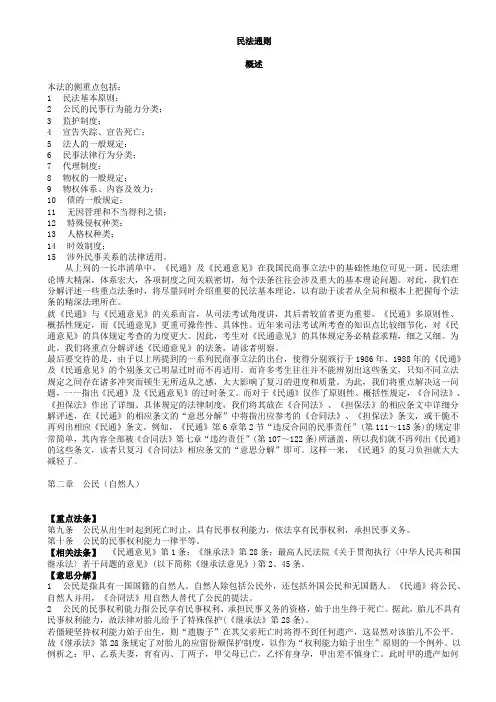
民法通则概述本法的侧重点包括:1 民法基本原则;2 公民的民事行为能力分类;3 监护制度;4 宣告失踪、宣告死亡;5 法人的一般规定;6 民事法律行为分类;7 代理制度;8 物权的一般规定;9 物权体系、内容及效力;10 债的一般规定;11 无因管理和不当得利之债;12 特殊侵权种类;13 人格权种类;14 时效制度;15 涉外民事关系的法律适用。
从上列的一长串清单中,《民通》及《民通意见》在我国民商事立法中的基础性地位可见一斑。
民法理论博大精深,体系宏大,各项制度之间关联密切,每个法条往往会涉及重大的基本理论问题。
对此,我们在分解评述一些重点法条时,将尽量同时介绍重要的民法基本理论,以有助于读者从全局和根本上把握每个法条的精深法理所在。
就《民通》与《民通意见》的关系而言,从司法考试角度讲,其后者较前者更为重要。
《民通》多原则性、概括性规定,而《民通意见》更重可操作性、具体性。
近年来司法考试所考查的知识点比较细节化,对《民通意见》的具体规定考查的力度更大。
因此,考生对《民通意见》的具体规定务必精益求精,细之又细。
为此,我们将重点分解评述《民通意见》的法条,请读者明察。
最后要交待的是,由于以上所提到的一系列民商事立法的出台,使得分别颁行于1986年、1988年的《民通》及《民通意见》的个别条文已明显过时而不再适用。
而许多考生往往并不能辨别出这些条文,只知不同立法规定之间存在诸多冲突而顿生无所适从之感,大大影响了复习的进度和质量。
为此,我们将重点解决这一问题,一一指出《民通》及《民通意见》的过时条文。
而对于《民通》仅作了原则性、概括性规定,《合同法》、《担保法》作出了详细、具体规定的法律制度,我们将其放在《合同法》、《担保法》的相应条文中详细分解评述,在《民通》的相应条文的“意思分解”中将指出应参考的《合同法》、《担保法》条文,或干脆不再列出相应《民通》条文。
例如,《民通》第6章第2节“违反合同的民事责任”(第111~115条)的规定非常简单,其内容全部被《合同法》第七章“违约责任”(第107~122条)所涵盖,所以我们就不再列出《民通》的这些条文,读者只复习《合同法》相应条文的“意思分解”即可。
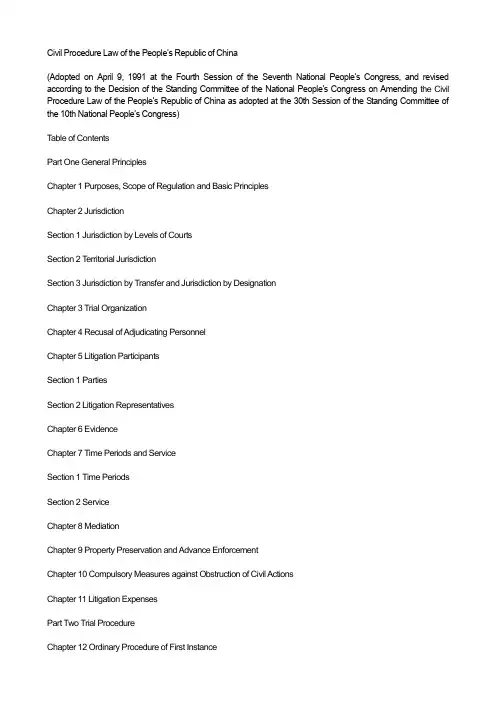
Civil Procedure Law of the People’s Republic of China(Adopted on April 9, 1991 at the Fourth Session of the Seventh National People’s Congress, and revised according to the Decision of the Standing Committee of the National People’s Congress on Amending the Civil Procedure Law of the People’s Republic of China as adopted at the 30th Session of the Standing Committee of the 10th National People’s Congress)T able of ContentsPart One General PrinciplesChapter 1 Purposes, Scope of Regulation and Basic PrinciplesChapter 2 JurisdictionSection 1 Jurisdiction by Levels of CourtsSection 2 T erritorial JurisdictionSection 3 Jurisdiction by Transfer and Jurisdiction by DesignationChapter 3 Trial OrganizationChapter 4 Recusal of Adjudicating PersonnelChapter 5 Litigation ParticipantsSection 1 PartiesSection 2 Litigation RepresentativesChapter 6 EvidenceChapter 7 Time Periods and ServiceSection 1 Time PeriodsSection 2 ServiceChapter 8 MediationChapter 9 Property Preservation and Advance EnforcementChapter 10 Compulsory Measures against Obstruction of Civil ActionsChapter 11 Litigation ExpensesPart Two Trial ProcedureSection 1 Filing and Accepting LawsuitsSection 2 Pretrial PreparationSection 3 Courtroom TrialSection 4 Lawsuit Suspension and ConclusionSection 5 Judgments and RulingsChapter 14 Procedure of Second InstanceChapter 15 Special ProcedureSection 1 General StipulationsSection 2 Cases Concerning the Credentials of VotersSection 3 Cases Concerning the Declaration of Missing or Dead PersonsSection 4 Cases Concerning the Determination of Citizens’ Capacities in Civil Conducts Section 5 Cases Concerning the Determination of Ownerless PropertyChapter 16 Procedure of Adjudication SupervisionChapter 17 Summary Procedure for Collecting DebtsChapter 18 Procedure of Public SummonPart Three Procedure of EnforcementChapter 19 General StipulationsChapter 20 Application and Referral of EnforcementChapter 21 Enforcement MeasuresChapter 22 Suspension and T ermination of EnforcementPart Four Special Provisions of the Civil Procedures Involving Foreign Elements Chapter 23 General PrinciplesChapter 24 JurisdictionChapter 25 Service and Time PeriodsChapter 26 Property PreservationChapter 27 ArbitrationPart One General PrinciplesChapter 1 Purposes, Scope of Regulation and Basic PrinciplesArticle 1 The Civil Procedure Law of the People’s Republic of China is formulated according to the Constitu tion and in the light of the experience and actual conditions of adjudicating civil cases in our country.Article 2 The purposes of the Civil Procedure Law of the People’s Republic of China are to protect the litigation rights exercised by the parties, to ensure that the people’s courts find facts, to distinguish right from wrong, to apply the law correctly, to try civil cases promptly, to affirm the rights and obligations in civil affairs, to impose sanctions for civil wrong doings, to protect the lawful rights and interests of the parties, to educate citizens to voluntarily abide by the law, to maintain the social and economic order, and to guarantee the smooth progress of the socialist construction.Article 3 The provisions of this Law shall apply to al l the civil litigation accepted by people’s courts regarding disputes over the status of property and personal relations among citizens, legal persons, or other organizations respectively and mutually between citizens, legal persons, or other organizations.Article 4 All those who involve in civil lawsuits within the territory of the People’s Republic of China must abide by this Law.Article 5 Foreign nationals, stateless persons, foreign enterprises, or organizations, which initiate or respond to lawsui ts in people’s courts, shall have the same litigation rights and obligations as the citizens, legal persons, or other organizations of the People’s Republic of China.Should the courts of a foreign country impose restrictions on the civil litigation rights of the citizens, legal persons, or other organizations of the People’s Republic of China, the people’s courts of the People’s Republic of China shall follow the principle of reciprocity regarding the civil litigation rights of the citizens, enterprises, or organizations of that foreign country.Article 6 The adjudication authority over civil cases shall be exercised by the people’s courts only.The people’s courts shall adjudicate civil cases independently according to law, and shall not be subject to any interference from an administrative organ, public organization, or individual.Article 7 The people’s courts must take the facts as the basis and take the law as the criterion when adjudicating civil cases.Article 8 All parties to a civil litigatio n shall have equal litigation rights. The people’s courts shall, when adjudicating civil cases, guarantee and facilitate all parties to exercise their litigation rights, and apply the law equally to all parties.Article 9 When adjudicating civil cases, t he people’s courts may mediate the disputes according to the principles of voluntariness and lawfulness; if a mediation agreement can not be reached, the courts shall render judgments without delay.Article 10 When adjudicating civil cases, the people’s courts shall apply the systems of collegial panel, recusal, public trial, and “two trials and the second one is final”.Article 11 Chinese citizens of all ethnicities shall have the right to use their native spoken and written languages in civil proceedings.In the areas where an ethnic minority is concentrated or a number of different ethnic nationalities live together, the people’s courts shall conduct hearings and publish legal documents in the spoken and written languages commonly used by these people.The people’s courts shall provide translations for any litigation participants who are not familiar with the spoken or written languages commonly used by the local people.Article 12 When adjudicating civil cases by the people’s court, the parties s hall have the right to engage in argument.Article 13 The parties to a civil litigation shall be entitled, within the scope stipulated by law, to dispose their rights of civil affairs and litigation.Article 14 The people’s procuratorates shall have the right to exercise legal supervision over the civil proceedings.Article 15 If the civil rights and interests of the state, a collective, or an individual have been infringed, a state organ, public organization, enterprise, or institution may support the injured unit or individual to initiate legal action in a people’s court.Article 16 The People’s Conciliation Committees are the organizations for mass to mediate civil disputes derived from private citizens under the guidance of basic people’s governments and the basic people’s courts.The People’s Conciliation Committees shall conduct all mediations according to legal provisions and the principle of voluntariness. All concerned parties shall enforce mediation agreement. Where any concerned parties refuse mediation, fail to reach a mediation agreement, or retract a mediation agreement, they may initiate legal proceedings in a people’s court.If a People’s Conciliation Committee violates the law when mediating civil disputes, the people’s court shall corr ect it.Article 17 The people’s congresses of the national autonomous areas may formulate some accommodating or supplementary provisions according to the principles of the Constitution and this Law and based on the specific circumstances of their localities. Such provisions made by an autonomous region shall be submitted to the Standing Committee of the National People’s Congress for approval. The provisions made by an autonomous prefecture or autonomous county shall be submitted to the standing committee of the people’s congress of the relevant autonomous region or province for approval and to the Standing Committee of the National People’s Congress for the record.Chapter 2 JurisdictionSection 1 Jurisdiction by Levels of CourtsArticle 18 A basic peo ple’s court shall have jurisdiction as the court of first instance over civil cases, unlessArticle 19 An intermediate people’s court shall have jurisdiction as courts of first instance over the following civil cases:(1)Major cases involving foreign elements;(2)Cases that have major impacts in the area of its jurisdiction; and(3)Cases under the jurisdiction of the intermediate people’s courts as determined by the Supreme People’s Court.Article 20 A higher people’s courts shall have jurisdiction as the court of first instance over civil cases that have major impacts on the areas of its jurisdiction.Article 21The Supreme People’s Court shall have jurisdiction as the court of first instance over the following civi l cases:(1)Cases that have major impacts on the whole country; and(2)Cases that the Supreme People’s Court deems should be adjudicated by itself.Section 2 T erritorial JurisdictionArticle 22 A civil lawsuit brought against a citizen shall be under t he jurisdiction of the people’s court located in the place where the defendant has his domicile; if the defendant’s domicile is different from his habitual residence, the lawsuit shall be under the jurisdiction of the people’s court located in the place of his habitual residence.A civil lawsuit brought against a legal person or an organization shall be under the jurisdiction of the people’s court located in the place where the defendant has its domicile.Where the domiciles or habitual residences of several defendants in the same lawsuit are in the areas under the jurisdiction of two or more people’s courts, all of those people’s courts shall have jurisdiction over the lawsuit.Article 23 The civil litigations described below shall be under the jurisdic tion of the people’s court located in the place where the plaintiff has his domicile; if the plaintiff’s domicile is different from his habitual residence, the lawsuit shall be under the jurisdiction of the people’ court located in the place of the plaintiff’s habitual residence. The relevant civil litigations are:(1)Litigations concerning the status of persons who do not reside within the territory of the People’s Republic of China;(2)Litigations concerning the status of persons whose whereabouts are unknown or whom have been declared missing;(3)Litigations brought against the persons who are undergoing reeducation through labor; and(4)Litigations brought against persons who are in imprisonment.Article 24 A lawsuit brought about a contract disput e shall be under the jurisdiction of the people’s court located in the place where the defendant has his domicile or where the contract is performed.Article 25 The parties to a contract may, through the written contract, choose a people’s court, which l ocated in the place where the defendant would have his domicile, the contract would be performed, the contract would be signed, the plaintiff would have his domicile, or the subject of the contract would be located, to have jurisdiction over the case, as long as this jurisdiction choice does not violate the provisions of this Law regarding the Jurisdiction by Level and the Exclusive Jurisdiction.Article 26 A lawsuit brought for insurance contract dispute shall be under the jurisdiction of the people’s co urt located in the place where the defendant has his domicile or where the insured subject matter is located.Article 27 A lawsuit brought for a negotiable instrument dispute shall be under the jurisdiction of the people’s court located in the place where the negotiable instrument is to be paid or where the defendant has his domicile.Article 28 A lawsuit brought for a dispute over transportation contract via railway, highway, water, air, or combined transportation shall be under the jurisdiction of the people’s court located in the place of the departure or the destination, or where the defendant has his domicile.Article 29 A lawsuit brought for a tortious act shall be under the jurisdiction of the people’s court located in the place where the infringing act took place or where the defendant has his domicile.Article 30 A lawsuit to claim damages caused by a railway, highway, water, or aviation transportation accident shall be under the jurisdiction of the people’s court located in the place where t he accident took place, where the vehicle or ship first arrived after the accident, where the aircraft first landed after the accident, or where the defendant has his domicile.Article 31 A lawsuit brought for damages caused by a ship collision or any other maritime accident shall be under the jurisdiction of the people’s court located in the place where the collision took place or where the collision ship first docked after the accident or where the ship at fault was detained, or where the defendant has his domicile.Article 32 A lawsuit brought for a maritime salvage shall be under the jurisdiction of the people’s court located in the place where the salvage took place or where the salvaged vessel first docked after the disaster.Article 33 A lawsuit b rought for a general average shall be under the jurisdiction of the people’s court located in the place where the ship first docked after the general average adjustment took place or the adjustment thereof was conducted or where the voyage ended.Article 34 The following cases shall be under the exclusive jurisdiction of the people’s courts herein specified:(1)A lawsuit brought for real estate shall be under the jurisdiction of the people’s court located in the place where the real estate is located;(2)A lawsuit concerning harbor operations shall be under the jurisdiction of the people’s court located in the place where the harbor is located; and(3)A lawsuit concerning an inheritance shall be under the jurisdiction of the people’s court located in th e place where the decedent had his domicile upon his death, or where the principal portion of his estate is located.Article 35 When two or more people’s courts have jurisdiction over a lawsuit, the plaintiff may bring his lawsuit in one of these people’s courts; if the plaintiff brings the lawsuit in two or more people’s courts that have jurisdiction over the lawsuit, it shall be handled by the people’s court that accepts the case first.Section 3 Jurisdiction by Transfer and Jurisdiction by DesignationArticle 36 If a people’s court discovers that a case it has accepted is not under its jurisdiction, it shall transfer the case to the people’s court that does have jurisdiction over the case. The people’s court to which a case has been transferred shall accept the case, and if it considers that, according to relevant regulations, the transferred case is not under its jurisdiction, it shall report to a superior people’s court for the designation of jurisdiction and shall not transfer the case to another p eople’s court without authorization.Article 37 If a people’s court which has jurisdiction over a case is unable to exercise the jurisdiction for a special reason, the superior people’s court shall designate another court to exercise the jurisdiction.I f there is a dispute over a jurisdiction among people’s courts, it shall be resolved by the disputing parties through consultation; if the dispute cannot be resolved through consultation, the disputing courts shall ask their superior people’s court to desi gnate the jurisdiction.Article 38 If a party rejects the jurisdiction of his case after the case was accepted by a people’s court, the party shall raise the rejection during the period for submitting briefs. The people’s court shall examine such objecti on. If the objection is tenable, the people’s court shall rule that the case be transferred to the people’s court that does have jurisdiction over the case; if the rejection is untenable, the people’s court shall overrule the objection.Article 39 People’s courts at higher levels shall have the authority to try civil cases over which people’s courts at lower levels have jurisdiction as courts of first instance; they may also transfer civil cases over which they themselves have jurisdiction as courts of fir st instance to people’s courts at lower levels for adjudication.If a people’s court at a lower level deems it necessary for a civil case of first instance under its jurisdiction to be tried by a people’s court at a higher level, it may request such a people’s court to adjudicate the case.Chapter 3 Trial OrganizationArticle 40 Civil cases of first instance shall be tried in a people’s court by a collegial bench consisting of both judges and assessors or of judges alone. The numbers of members of a collegial bench shall be odd.Civil cases to which summary procedure is applied shall be tried by a single judge alone.When carrying out their duties as assessors, the assessors shall have equal rights and obligations as the judges.Article 41 Civil ca ses of second instance shall be tried in a people’s court by a collegial bench of judges. The numbers of members of a collegial bench shall be odd.For the retrial of a remanded case, the people’s court of first instance shall form a new collegial bench a ccording to the procedure of first instance.If a case for retrial was originally tried at first instance, a new collegial bench shall be formed according to the procedure of first instance; if the case was originally tried at second instance or was remov ed to a people’s court at a higher level for trial, a new collegial bench shall be formed according to the procedure of second instance.Article 42 The president of the court or the chief judge of a division shall designate a judge to serve as the presiding judge of the collegial bench; if the president or the chief judge participates in trial, he himself shall serve as the presiding judge.Article 43 When deliberating a case, a collegial bench shall observe the principle of minority obeying majority. The deliberations shall be recorded in writing, and the transcript shall be signed by the members of the collegial bench. The dissenting opinions in the deliberations shall be truthfully recorded in the transcript.Article 44 The adjudicating personnel shall handle the case impartially and according to law.The adjudicating personnel shall not accept a treat or gift from the parties or their agents.Any adjudicating personnel who commits embezzlement, accepts bribes, practices favoritism for himself or relatives, twists the law in rendering judgment shall be investigated for legal responsibility; if a crime is committed, the offender shall be investigated for criminal responsibility according to law.Chapter 4 Recusal of Adjudicating PersonnelArticle 45 Any member of the adjudicating personnel in any of the following circumstances shall be disqualified, and the litigation parties shall also have the right to request, orally or in writing, such an adjudicator to be withdrawn from this case. The relevant circumstances are:(1)He is a party or a near relative of a party or a near relative of a litigation representative to the case;(2)He has a personal interest in the case; or(3)He has some other relationship with a party to the case, which could influence the impartial adjudication.The above provisions shall also apply to clerks, interpreters, expert witnesses, and examiners.Article 46 When a party makes a request to disqualify an adjudicator, he shall make an explanation and submit the request at the beginning of the proceedings; a request for recusal may also be submitted before the end of court debate if the recusal reason is uncovered after the proceeding begins.If a recusal decision is waiting for a people’s court to decide, the personnel w ho have been requested to be disqualified shall temporarily be suspended from participating in the proceedings, but with the exception of cases that require emergency measures.Article 47 The recusal of a court president who serves as the presiding judge shall be decided by the adjudicating committee; the recusal of adjudicators shall be decided by the court president; the recusal of other personnel shall be decided by the presiding judge.Article 48 The decision of a people’s court on a request for recu sal shall be made orally or in writing within three days after the request was made. If a party is not satisfied with a recusal decision, it may apply for reconsideration once. During the period of reconsideration, the personnel who have been requested to be disqualified shall not be suspended from participating in the proceedings. The decision of a people’s court on an application for reconsideration shall be made within three days after receiving the application and the person who has made the application for reconsideration shall be notified of the decision.Chapter 5 Litigation ParticipantsSection 1 PartiesLegal persons shall be represented by their legal representatives in litigation. Other organizations shall be represented by their principal leading personnel in litigation.Article 50 The parties shall have the right to appoint representatives, request recusals of adjudicating personnel, collect and provide evidence, engage in debate, request mediation, file an appeal, and apply for an enforcement of judgments.The parties may consult the materials relating to the court proceedings of the case and copy the materials and other legal documents pertaining to the case. However, materials involving state secrets, trade secrets, or the private affairs of individuals shall be exceptions.The parties must exercise their litigation rights according to the law, observe litigation procedures and carry out legally effective written judgments or orders and mediation statements.Article 51 The two parties may reach a settlement agreement on their own.Article 52 The plaintiff may relinquish or modify his claim. The defendant may confirm or repudiate the claim and shall have the right to file a counterclaim.Article 53 When one party or both parties consist of two or more persons and the subject matter of the action is the same or under the same category, the people’s court may adjudicate them together up on the consent of all the parties. Such adjudication is called joint litigation.If a party of two or more persons of a joint litigation who have the common rights and obligations with respect to the subject matter of action and the act of any of them is recognized by the others of the party, such an act shall bind the rest of the party; if a party of two or more persons have no common rights and obligations with respect to the subject matter of action, any acts taken by any one of them shall not bind the rest of the party.Article 54 A joint litigation in which one party has numerous litigants may be brought by the representatives elected by the litigants of the party. The act of litigation taken by these representatives shall bind all litigants of the party whom they represent. However, any substitution of representatives, relinquishing claims, acceptance of claims of the opposing party, or negotiating settlement shall be approved by the litigants of the party.Article 55 Where the subject matters of an action is under the same category and one of the parties has numerous litigants but the exact number of the litigants is uncertain when the lawsuit is filed, the people’s court may issue a public notice to explain the nature of the case and the claims of the litigation and informing those interested persons who are entitled to the claim to register their rights with the people’s court within a fixed period of time.Those who have registered their rights with the people’s court may elect representatives f rom among themselves to proceed with the litigation; if the election fails its purpose, such representatives may be determined by the people’s court through consultation with those who have registered their rights with the court.The acts of litigation taken by these representatives shall bind all litigants of the party whom they represent. However, any substitution of representatives, relinquishing claims, acceptance of claims of the opposing party, or negotiating settlement shall be approved by the litigants of the party.The judgments or written orders rendered by the people’s court shall bind all those interested persons who have registered their rights with the court. Such judgments or written orders shall apply to those who have not registeredArticle 56 If a third party considers that he has the independent right to claim the subject matter of the action of both parties, he shall have the right to bring an action.If a third party does not have the independent right to claim the subject matter of the action of both parties but the outcome of the case will affect his legal interest, it may file a request to join the litigation or the people’s court may notify him to join the litigation. If a people’s court holds a third party to bear a civil liability, such a third party shal l have the litigation rights as a party to the litigation.Section 2 Litigation RepresentativesArticle 57 For litigation-incompetent persons, their guardians shall be their legal representative in their litigations. If all legal representatives try to avoid their duties of representation, the people’s court may appoint one of them as the litigation represent.Article 58 Each party or legal representative may appoint one or two persons to act as his litigation representatives.Lawyers, a party’s near relatives, persons recommended by relevant public organizations or the units to which a party belongs, or any other citizens appr oved by a people’s court may be entrusted as the party’s litigation representatives.Article 59 When a party entrusts a person to be his litigation representative, he shall submit a power of attorney bearing his signature or seal to the people’s court.The power of attorney must specify the matters and authority scopes entrusted. A litigation representative must possess special authorization from his principal to be able to accept, relinquish, or modify the claim, to reach a settlement, or bring a counterclaim or an appeal.When a citizen of the People’s Republic of China, who is residing abroad, mails or entrusts someone to deliver a power of attorney to China, he shall have the power of attorney certified by the Chinese embassy or consulate to that country. If there is no Chinese embassy or consulate in that country, he shall have the power of attorney certified by an embassy or a consulate of a third country, which has diplomatic relations with the People’s Republic of China and is stationed in the c ountry, and then be transferred to the embassy or consulate of the People’s Republic of China stationed in that third state for verification; he may have the power of attorney certified by a local patriotic overseas Chinese organization.Article 60 A part y who changes or revokes the authority of his litigation representative shall inform the people’s court in writing and the court shall notify the other party of the change or revocation.Article 61 Lawyers who serve as litigation representatives or other litigation representatives shall have the right to investigate and collect evidence, and may consult relevant materials to the case. The scopes and measures of consulting relevant materials to a case shall be regulated by the Supreme People’s Court.Article 62 For a divorce case in which a party has appointed a litigation representative, that party shall appear in court in person unless he is incapable of expressing his own opinion. A party who is truly unable to appear in court due to a special reason s hall submit his opinion in writing to the people’s court.Chapter 6 Evidence。
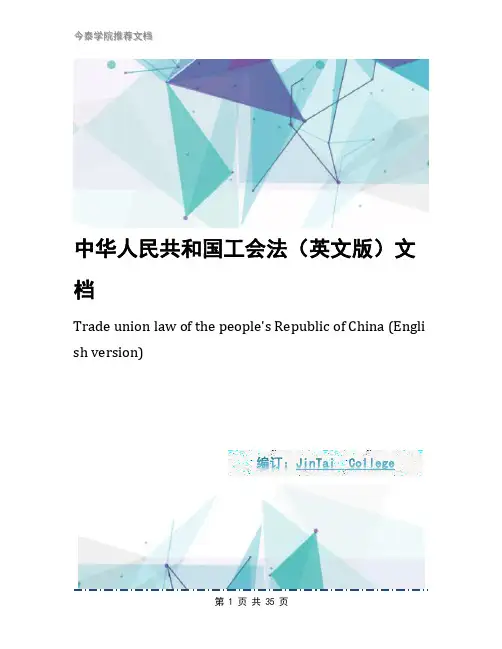
中华人民共和国工会法(英文版)文档Trade union law of the people's Republic of China (Engli sh version)中华人民共和国工会法(英文版)文档小泰温馨提示:规章制度是指用人单位制定的组织劳动过程和进行劳动管理的规则和制度的总和。
本文档根据规则制度书写要求展开说明,具有实践指导意义,便于学习和使用,本文下载后内容可随意修改调整修改及打印。
工会是职工自愿结合的工人阶级的群众组织。
下面小泰为大家精心搜集了关于中华人民共和国的工会法,欢迎大家参考借鉴,希望可以帮助到大家!第一章总则第一条为保障工会在国家政治、经济和社会生活中的地位,确定工会的权利与义务,发挥工会在社会主义现代化建设事业中的作用,根据宪法,制定本法。
Article 1 This Law is formulated in accordancewith the Constitution in order to protect the position of trade unions in State political, economic and social life, to clarify the rights and obligations of trade unions and to enable them to play their proper role in the development of China's socialist modernization.第二条工会是职工自愿结合的工人阶级的群众组织。
Article 2 Trade unions are mass organizations formed by the working classes of their own free will.第三条在中国境内的企业、事业单位、机关中以工资收入为主要生活来源的体力劳动者和脑力劳动者,不分民族、种族、性别、职业、宗教信仰、教育程度,都有依法参加和组织工会的权利。
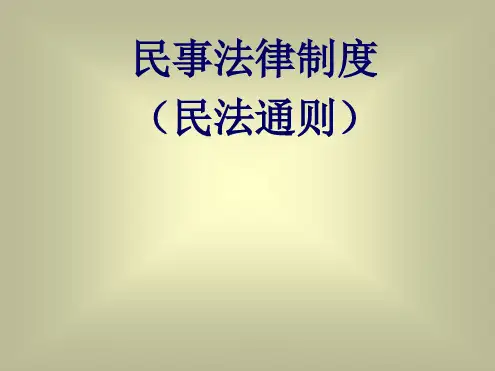
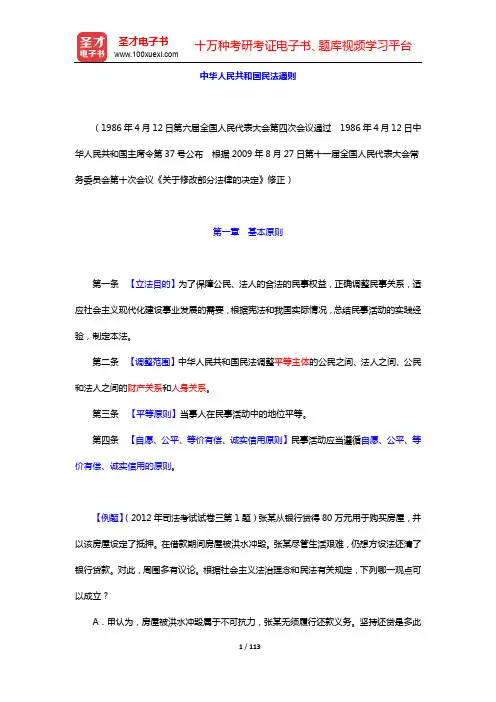
中华人民共和国民法通则(1986年4月12日第六届全国人民代表大会第四次会议通过1986年4月12日中华人民共和国主席令第37号公布根据2009年8月27日第十一届全国人民代表大会常务委员会第十次会议《关于修改部分法律的决定》修正)第一章基本原则第一条【立法目的】为了保障公民、法人的合法的民事权益,正确调整民事关系,适应社会主义现代化建设事业发展的需要,根据宪法和我国实际情况,总结民事活动的实践经验,制定本法。
第二条【调整范围】中华人民共和国民法调整平等主体的公民之间、法人之间、公民和法人之间的财产关系和人身关系。
第三条【平等原则】当事人在民事活动中的地位平等。
第四条【自愿、公平、等价有偿、诚实信用原则】民事活动应当遵循自愿、公平、等价有偿、诚实信用的原则。
【例题】(2012年司法考试试卷三第1题)张某从银行贷得80万元用于购买房屋,并以该房屋设定了抵押。
在借款期间房屋被洪水冲毁。
张某尽管生活艰难,仍想方设法还清了银行贷款。
对此,周围多有议论。
根据社会主义法治理念和民法有关规定,下列哪一观点可以成立?A.甲认为,房屋被洪水冲毁属于不可抗力,张某无须履行还款义务。
坚持还贷是多此一举B.乙认为,张某已不具备还贷能力,无须履行还款义务。
坚持还贷是为难自己C.丙认为,张某对房屋的毁损没有过错,且此情况不止一家,银行应将贷款作坏账处理。
坚持还贷是一厢情愿D.丁认为,张某与银行的贷款合同并未因房屋被冲毁而消灭。
坚持还贷是严守合约、诚实信用【答案】D【考点】诚实信用原则【解析】A项,《民法通则》第4条规定,民事活动应当遵循自愿、公平、等价有偿、诚实信用的原则。
诚实信用是要求按照市场制度的互惠性行事。
在缔约时,诚实并不欺不诈;在缔约后,守信用并自觉履行。
BC两项,即使张某不具备还贷能力,借贷合同和抵押合同成立,张某应当负担风险履行还贷义务。
D项,社会主义法治理念中公平正义价值要求是每一个社会成员的正当利益和合理诉求平等地在法律中得到表达和体现,公平地得到法律的保障和维护。
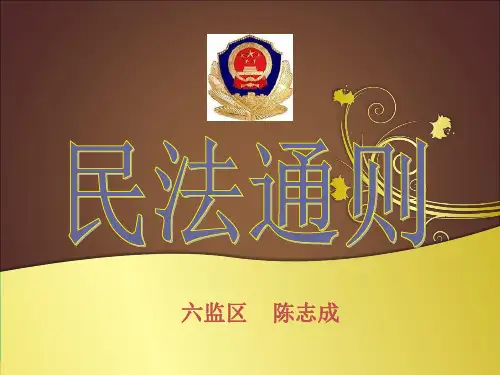
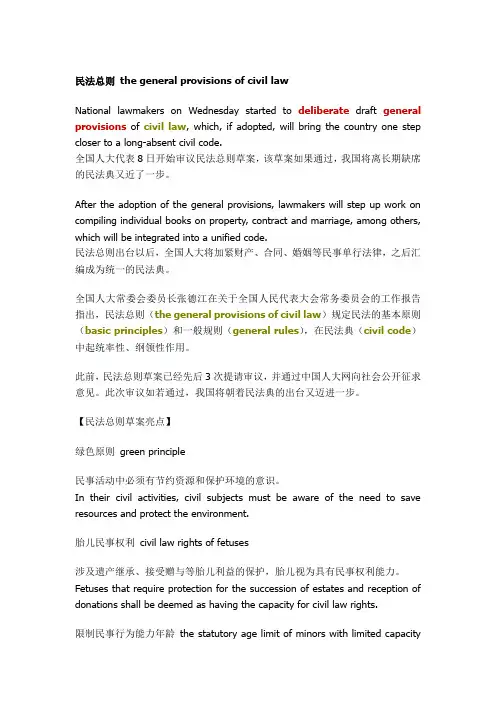
民法总则the general provisions of civil lawNational lawmakers on Wednesday started to deliberate draft general provisions of civil law, which, if adopted, will bring the country one step closer to a long-absent civil code.全国人大代表8日开始审议民法总则草案,该草案如果通过,我国将离长期缺席的民法典又近了一步。
After the adoption of the general provisions, lawmakers will step up work on compiling individual books on property, contract and marriage, among others, which will be integrated into a unified code.民法总则出台以后,全国人大将加紧财产、合同、婚姻等民事单行法律,之后汇编成为统一的民法典。
全国人大常委会委员长张德江在关于全国人民代表大会常务委员会的工作报告指出,民法总则(the general provisions of civil law)规定民法的基本原则(basic principles)和一般规则(general rules),在民法典(civil code)中起统率性、纲领性作用。
此前,民法总则草案已经先后3次提请审议,并通过中国人大网向社会公开征求意见。
此次审议如若通过,我国将朝着民法典的出台又迈进一步。
【民法总则草案亮点】绿色原则green principle民事活动中必须有节约资源和保护环境的意识。
In their civil activities, civil subjects must be aware of the need to save resources and protect the environment.胎儿民事权利civil law rights of fetuses涉及遗产继承、接受赠与等胎儿利益的保护,胎儿视为具有民事权利能力。
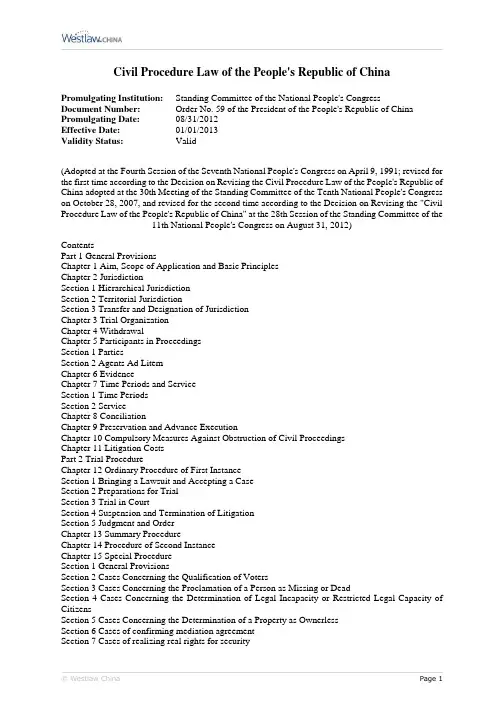
Civil Procedure Law of the People's Republic of China Promulgating Institution: Standing Committee of the National People's CongressDocument Number: Order No. 59 of the President of the People's Republic of China Promulgating Date: 08/31/2012Effective Date: 01/01/2013Validity Status: Valid(Adopted at the Fourth Session of the Seventh National People's Congress on April 9, 1991; revised for the first time according to the Decision on Revising the Civil Procedure Law of the People's Republic of China adopted at the 30th Meeting of the Standing Committee of the Tenth National People's Congress on October 28, 2007, and revised for the second time according to the Decision on Revising the "Civil Procedure Law of the People's Republic of China" at the 28th Session of the Standing Committee of the 11th National People's Congress on August 31, 2012)ContentsPart 1 General ProvisionsChapter 1 Aim, Scope of Application and Basic PrinciplesChapter 2 JurisdictionSection 1 Hierarchical JurisdictionSection 2 Territorial JurisdictionSection 3 Transfer and Designation of JurisdictionChapter 3 Trial OrganizationChapter 4 WithdrawalChapter 5 Participants in ProceedingsSection 1 PartiesSection 2 Agents Ad LitemChapter 6 EvidenceChapter 7 Time Periods and ServiceSection 1 Time PeriodsSection 2 ServiceChapter 8 ConciliationChapter 9 Preservation and Advance ExecutionChapter 10 Compulsory Measures Against Obstruction of Civil ProceedingsChapter 11 Litigation CostsPart 2 Trial ProcedureChapter 12 Ordinary Procedure of First InstanceSection 1 Bringing a Lawsuit and Accepting a CaseSection 2 Preparations for TrialSection 3 Trial in CourtSection 4 Suspension and Termination of LitigationSection 5 Judgment and OrderChapter 13 Summary ProcedureChapter 14 Procedure of Second InstanceChapter 15 Special ProcedureSection 1 General ProvisionsSection 2 Cases Concerning the Qualification of VotersSection 3 Cases Concerning the Proclamation of a Person as Missing or DeadSection 4 Cases Concerning the Determination of Legal Incapacity or Restricted Legal Capacity of CitizensSection 5 Cases Concerning the Determination of a Property as OwnerlessSection 6 Cases of confirming mediation agreementSection 7 Cases of realizing real rights for securityChapter 16 Procedure for Trial SupervisionChapter 17 Urge and Supervision ProcedureChapter 18 Procedure for Publicizing Public Notice for Assertion of ClaimsPart 3 Procedure of ExecutionChapter 19 General ProvisionsChapter 20 Application for Execution and ReferralChapter 21 Execution MeasuresChapter 22 Suspension and Termination of ExecutionPart 4 Special Provisions for Civil Proceedings of Cases Involving Foreign ElementChapter 23 General PrinciplesChapter 24 JurisdictionChapter 25 Service and Time PeriodsChapter 26 ArbitrationChapter 27 Judicial AssistancePart 1: General ProvisionsChapter 1: Aim, Scope of Application and Basic PrinciplesArticle 1 The Civil Procedure Law of the People's Republic of China is formulated on the basis of the Constitution and in the light of the experience and actual conditions of our country in the trial of civil cases.Article 2 The Civil Procedure Law of the People's Republic of China aims to protect the exercise of the litigation rights of the parties and ensure the ascertaining of facts by the people's courts, distinguish right from wrong, apply the law correctly, try civil cases promptly, affirm civil rights and obligations, impose sanctions for civil wrongs, protect the lawful rights and interests of the parties, educate citizens to voluntarily abide by the law, maintain the social and economic order, and guarantee the smooth progress of the socialist construction.Article 3 In dealing with civil litigation arising from disputes on property and personal relations between citizens, legal persons or other organizations and between the three of them, the peoples' courts shall apply the provisions of this Law.Article 4 Whoever engages in civil litigation within the territory of the People's Republic of China must abide by this Law.Article 5 Foreign nationals, stateless persons, foreign enterprises and organizations that bring suits or enter appearance in the people's courts shall have the same litigation rights and obligations as citizens, legal persons and other organizations of the People's Republic of China.If the courts of a foreign country impose restrictions on the civil litigation rights of the citizens, legal persons and other organizations of the People's Republic of China, the people's courts of the People's Republic of China shall follow the principle of reciprocity regarding the civil litigation rights of the citizens, enterprises and organizations of that foreign country.Article 6 The people's courts shall exercise judicial powers with respect to civil cases.The people's courts shall try civil cases independently in accordance with the law, and shall be subject to no interference by any administrative organ, public organization or individual.Article 7 In trying civil cases, the people's courts must base themselves on facts and take the law as the criterion.Article 8 The parties in civil litigation shall have equal litigation rights. The people's courts shall, in conducting the trials, safeguard their rights, facilitate their exercising the rights, and apply the law equally to them.Article 9 In trying civil cases, the people's courts shall conduct conciliation for the parties on a voluntary and lawful basis; if conciliation fails, judgments shall be rendered without delay.Article 10 In trying civil cases, the people's courts shall, according to the provisions of the law, follow the systems of panel hearing, withdrawal, public trial and the court of second instance being that of last instance.Article 11 Citizens of all nationalities shall have the right to use their native spoken and written languages in civil proceedings.Where minority nationalities live in aggregation in a community or where several nationalities live together in one area, the people's courts shall conduct hearings and issue legal documents in the spoken and written languages commonly used by the local nationalities.The people's courts shall provide translations for any participant in the proceedings who is not familiar with the spoken or written languages commonly used by the local nationalities.Article 12Parties to civil actions are entitled in the trials by the people's courts to argue for themselves.Article 13 Civil litigation shall observe the principle of honesty and good faith.The parties are free to deal with their own civil rights and litigation rights the way they prefer within the scope provided by the law.Article 14 The people’s procuratorate shall have the right to conduct legal supervision over civil litigation.Article 15 Where an act has infringed upon the civil rights and interests of the State, a collective organization or an individual, any State organ, public organization, enterprise or institution may support the injured unit or individual to bring an action in a people's court.Article 16The people's congresses of the national autonomous regions may formulate, in accordance with the Constitution and the principles of this Law, and in conjunction with the specific circumstances of the local nationalities, adaptive and supplementary provisions. Such provisions made by an autonomous region shall be submitted to the Standing Committee of the National People's Congress for approval; those made by an autonomous prefecture or autonomous county shall be submitted to the standing committee of the people's congress of the relevant province or autonomous region for approval and to the Standing Committee of the National People's Congress for the record.Chapter 2: JurisdictionSection 1: Hierarchical JurisdictionArticle 17 The primary people's courts shall have jurisdiction as courts of first instance over civil cases, unless otherwise provided in this Law.Article 18 The intermediate people's courts shall have jurisdiction as courts of first instance over the following civil cases:(1) major cases involving foreign element;(2) cases that have major impact on the area under their jurisdiction; and(3) cases as determined by the Supreme People's Court to be under the jurisdiction of the intermediate people's courts.Article 19 The high people's courts shall have jurisdiction as courts of first instance over civil cases that have major impact on the areas under their jurisdiction.Article 20 The Supreme People's Court shall have jurisdiction as the court of first instance over the following civil cases:(1) cases that have major impact on the whole country; and(2) cases that the Supreme People's Court deems it should try.Section 2: Territorial JurisdictionArticle 21 A civil lawsuit brought against a citizen shall be under the jurisdiction of the people's court of the place where the defendant has his domicile; if the place of the defendant's domicile is different from that of his habitual residence, the lawsuit shall be under the jurisdiction of the people's court of the place of his habitual residence.A civil lawsuit brought against a legal person or any other organization shall be under the jurisdiction of the people's court of the place where the defendant has his domicile.Where the domiciles or habitual residences of several defendants in the same lawsuit are in the areas under the jurisdiction of two or more people's courts, all of those people's courts shall have jurisdiction over the lawsuit.Article 22 The civil lawsuits described below shall be under the jurisdiction of the people's court of the place where the plaintiff has his domicile; if the place of the plaintiff's domicile is different from that of his habitual residence, the lawsuit shall be under the jurisdiction of the people's court of the place of the plaintiff's habitual residence:(1) those concerning personal status brought against persons not residing within the territory of the People's Republic of China;(2) those concerning the personal status of persons whose whereabouts are unknown or who have been declared as missing.(3) those brought against persons who are undergoing mandatory education measures; and(4) those brought against persons who are in imprisonment.Article 23 A lawsuit brought on a contract dispute shall be under the jurisdiction of the people's court of the place where the defendant has his domicile or where the contract is performed.Article 24 A lawsuit brought on an insurance contract dispute shall be under the jurisdiction of the people's court of the place where the defendant has his domicile or where the insured object is located.Article 25 A lawsuit brought on a bill dispute shall be under the jurisdiction of the people's court of the place where the bill is to be paid or where the defendant has his domicile.Article 26 A lawsuit arising out of disputes caused by the establishment, confirmation of shareholders’qualification, profit distribution or dissolution of a company shall be under the jurisdiction of the people’s court in the place where the company is located.Article 27 A lawsuit arising from a dispute over a railway, road, water, or air transport contract or over a combined transport contract shall be under the jurisdiction of the people's court of the place of dispatch or the place of destination or where the defendant has his domicile.Article 28 A lawsuit brought on a tort action shall be under the jurisdiction of the people's court of the place where the tort is committed or where the defendant has his domicile.Article 29 A lawsuit brought on claims for damages caused by a railway, road, water transport or air accident shall be under the jurisdiction of the people's court of the place where the accident occurred or where the vehicle or ship first arrived after the accident or where the aircraft first landed after the accident, or where the defendant has his domicile.Article 30 A lawsuit brought on claims for damages caused by a collision at sea or by any other maritime accident shall be under the jurisdiction of the people's court of the place where the collision occurs or where the ship in collision first docks after the accident or where the ship having inflicted the injury is detained, or where the defendant has his domicile.Article 31 A lawsuit instituted for expenses of maritime salvage shall be under the jurisdiction of the people's court of the place where the salvage took place or where the salvaged ship first docked after the disaster.Article 32 A lawsuit brought for general average shall be under the jurisdiction of the people's court of the place where the ship first docked or where the adjustment of general average is conducted or where the voyage ends.Article 33 The following cases shall be under the exclusive jurisdiction of the people's courts herein specified:(1) a lawsuit brought on a dispute over real estate shall be under the jurisdiction of the people's court of the place where the estate is located;(2) a lawsuit brought on a dispute over harbour operations shall be under the jurisdiction of the people's court of the place where the harbour is located; and(3) a lawsuit brought on a dispute over succession shall be under the jurisdiction of the people's court of the place where the decedent had his domicile upon his death, or where the principal part of his estate is located.Article 34 A party to the contract or other property dispute may choose by written agreement to be under the jurisdiction of the people’s court in the location of the defendant’s domicile, where the contract is performed or signed, in the location of the plaintiff’s domicile, in the location of the subject matter or in other locations which have actual connections with the dispute, provided that the provisions on hierarchical jurisdiction and exclusive jurisdiction are not violated.Article 35 When two or more people's courts have jurisdiction over a lawsuit, the plaintiff may bring his lawsuit with one of these people's courts; if the plaintiff brings the lawsuit in two or more people's courts that have jurisdiction over the lawsuit, the people's court that places the case on docket first shall have jurisdiction.Section 3: Transfer and Designation of JurisdictionArticle 36 If a people's court finds that a case it has accepted is not under its jurisdiction, it shall refer the case to the people's court that has jurisdiction over the case. The people's court to which a case has been referred shall accept the case, and if it considers that, according to the relevant regulations, the case referred to it is not under its jurisdiction, it shall report to a superior people's court for the designation of jurisdiction and shall not independently refer the case again to another people's court. Article 37 If a people's court which has jurisdiction over a case is unable to exercise the jurisdiction for special reasons, a superior people's court shall designate another court to exercise jurisdiction.In the event of a jurisdictional dispute between two or more people's courts, it shall be resolved by the disputing parties through consultation; if the dispute cannot be so resolved, it shall be reported to their common superior people's court for the designation of jurisdiction.Article 38 A people's court of the higher level has the right to hear civil cases of first instance which fall under the jurisdiction of people's courts of lower levels. Where a court finds it necessary to transfer the civil case of first instance under its jurisdiction to the court of lower levels for trial, it shall submit the same to the court of higher level for approval.If a people's court at a lower level that has jurisdiction over a civil case as court of first instance deems it necessary to have the case to be tried by a people's court at a higher level, it may submit it to and request the people's court at a higher level to try the case.Chapter 3: Trial OrganizationArticle 39 The people's court of first instance shall try civil cases by a collegial panel composed of both judges and judicial assessors or of judges alone. The collegial panel must have an odd number of members.Civil cases in which summary procedure is followed shall be tried by a single judge alone.When performing their duties, the judicial assessors shall have equal rights and obligations as the judges.Article 40 The people's court of second instance shall try civil cases by a collegial panel of judges. The collegial panel must have an odd number of members.For the retrial of a remanded case, the people's court of first instance shall form a new collegial panel in accordance with the procedure of first instance.If a case for retrial is originally tried at first instance, a new collegial panel shall be formed according to the procedure of first instance; if the case is originally tried at second instance or is brought by a people's court at a higher level to it for trial, a new collegial panel shall be formed according to the procedure of second instance.Article 41 The president of the court or the chief judge of a division of the court shall designate a judge to serve as the presiding judge of the collegial panel; if the president or the chief judge participates in the trial, he himself shall serve as the presiding judge.Article 42When deliberating a case, a collegial panel shall observe the rule of majority. The deliberations shall be recorded in writing, and the transcript shall be signed by the members of the collegial panel. Dissenting opinions in the deliberations must be truthfully entered in the transcript. Article 43 The judicial officers shall deal with all cases impartially and in accordance with the law. The judicial officers shall not accept any treat or gift from the parties or their agents ad litem.Any judicial officer who commits embezzlement, accepts bribes, engages in malpractice for personal benefits or who perverts the law in passing judgment shall be investigated for legal responsibility; if the act constitutes a crime, the offender shall be investigated for criminal responsibility according to the law.Chapter 4: WithdrawalArticle 44 A judicial officer falling under one of the following circumstances shall withdraw from the case, or the party may apply for his withdrawal by oral or written form:(1) where the judicial officer is a party to the case or close relative to a party or agent ad litem;(2) where the judicial officer is an interested party in the case;(3) where judicial officer has other relationship with a party or agent ad litem, and such relationship may affect the impartial trial of the case.Where the judicial officer accepts gifts or entertainment of the party or agent ad litem or meets with a party or agent ad litem in violation of relevant provisions, the party concerned shall have the right to file a request for his withdrawal.Where a judicial officer falls under the circumstance stipulated in the preceding paragraph, such judicial officer shall be subject to legal liability according to the law.The provisions in Paragraphs 1 to 3 herein shall apply to clerks, interpreters, expert witnesses and inspection personnel.Article 45 In applying for the withdrawal, the party shall state the reason and submit the application at the beginning of the proceedings; the application may also be submitted before the closing of arguments in court if the reason for the withdrawal is known to him only after the proceedings begin. Pending a decision by the people's court regarding the withdrawal applied for, the judicial officer concerned shall temporarily suspend his participation in the proceedings, with the exception, however, of cases that require the taking of emergency measures.Article 46 The withdrawal of the presiding judge who is president of the court shall be decided by the judicial committee; the withdrawal of judicial officers shall be decided by the court president; and the withdrawal of other personnel by the presiding judge.Article 47 When a party concerned applies for the withdrawal of any judicial officer from a case, the people's court shall make a decision orally or in writing within three days after the application is made. The applicant, if dissatisfied with the decision, may make a request for review once. During the period of review, the person required to withdraw from the case under the application shall not cease his or herparticipation in the case. The people's court shall, within three days, make a decision of review and notify the review applicant.Chapter 5: Participants in ProceedingsSection 1: PartiesArticle 48Citizens, legal persons and other organizations may be parties concerned in civil litigation.Legal persons shall be represented by their legal representatives in the litigation. Other organizations shall be represented by their principal heads in the proceedings.Article 49 Parties to an action shall have the right to appoint agents, apply for withdrawals, collect and provide evidence, proffer arguments, request conciliation, file an appeal and apply for execution. Parties to an action may have access to materials pertaining to the case and make copies thereof and other legal documents pertaining to the case. The scope of and rules for consulting and making copies of them shall be specified by the Supreme People's Court.Parties to an action must exercise their litigation rights in accordance with the law, observe the procedures and carry out legally effective written judgments or orders and conciliation statements. Article 50 The two parties may reach a compromise of their own accord.Article 51 The plaintiff may relinquish or modify his claims. The defendant may admit or rebut the claims and shall have the right to file counterclaims.Article 52 When one party or both parties consist of two or more than two persons, their subject matter of action being the same or of the same category and the people's court considers that, with the consent of the parties, the action can be tried combined, it is a joint action.If a party of two or more persons to a joint action have common rights and obligations with respect to the subject matter of action and the act of any one of them is recognized by the others of the party, such an act shall be valid for all the rest of the party; if a party of two or more persons have no common rights and obligations with respect to the subject matter of action, the act of any one of them shall not be valid for the rest.Article 53 If the persons comprising a party to a joint action is large in number, the party may elect representatives from among themselves to act for them in the litigation. The acts of such representatives in the litigation shall be valid for the party they represent. However, modification or waiver of claims or admission of the claims of the other party or pursuing a compromise with the other party by the representatives shall be subject to the consent of the party they represent.Article 54 Where the subject matter of action is of the same category and the persons comprising one of the parties is large but uncertain in number at the commencement of the action, the people's court may issue a public notice, stating the particulars and claims of the case and informing those entitled to participate in the action to register their rights with the people's court within a fixed period of time. Those who have registered their rights with the people's court may elect representatives from among themselves to proceed with the litigation; if the election fails its purpose, such representatives may be determined by the people's court through consultation with those who have registered their rights with the court.The acts of such representatives in the litigation shall be valid for the party they represent; however, modification or waiver of claims or admission of the claims of the other party or pursuing a compromise with the other party by the representatives shall be subject to the consent of the party they represent. The judgments or written orders rendered by the people's court shall be valid for all those who have registered their rights with the court. Such judgments or written orders shall apply to those who have not registered their rights but have instituted legal proceedings during period of limitation of the action. Article 55 Relevant bodies and organizations prescribed by the law may bring a suit to the people's court against such acts as environmental pollution, harm of the consumer’s legitimate interests andrights and other acts that undermine the social and public interest.Article 56 If a third party considers that he has an independent claim to the subject matter of action of both parties, he shall have the right to bring an action.Where the outcome of the case will affect a third party's legal interest, such party, though having no independent claim to the subject matter of action of both parties, may file a request to participate in the proceedings or the people's court shall notify the third party to participate. A third party that is to bear civil liability in accordance with the judgment of the people's court shall be entitled to the rights and obligations of a party in litigation.In case the third party as stipulated in the preceding two paragraphs fails to participate in the proceedings for reasons not attributable to itself but has evidence to prove part or the entirety of the judgment, ruling, or mediation agreement with legal effectiveness has errors in content and prejudices its civil rights and interests, it shall, within six months after the date on which it knows or should know its rights and interests are prejudiced, file litigation with the people's court rendering such judgment, ruling or mediation agreement. Where the people's court finds the claims established upon trial, it shall change or cancel the original judgment, ruling or mediation agreement; where the people's court finds the claims not established upon trial, the claims shall be rejected.Section 2: Agents Ad LitemArticle 57 Any person with no legal capacity to engage in litigation shall have his guardian or guardians as statutory agents to act for him in a lawsuit. If the statutory agents try to shift responsibility as agents ad litem upon one another, the people's court shall appoint one of them to represent the person in litigation.Article 58 A party to an action, or statutory agent may appoint one or two persons to act as his agents ad litem.The following persons may be appointed as agent ad litem to a case:(1) Lawyer, or primary-level legal service provider;(2) Near relative or working staff of the party; or(3) Citizen recommended by the community, unit or relevant social organization to which the party belongs.Article 59 When a person appoints another to act on his behalf in litigation, he must submit to the people's court a power of attorney bearing his signature or seal.The power of attorney must specify the matters entrusted and the powers conferred. An agent ad litem must obtain special powers from his principal to admit, waive or modify claims, or to compromise or to file a counterclaim or an appeal.A power of attorney mailed or delivered through others by a citizen of the People's Republic of China residing abroad must be certified by the Chinese embassy or consulate accredited to that country. If there is no Chinese embassy or consulate in that country, the power of attorney must be certified by an embassy or a consulate of a third country accredited to that country that has diplomatic relations with the People's Republic of China, and then transmitted for authentication to the embassy or consulate of the People's Republic of China accredited to that third country, or it must be certified by a local patriotic overseas Chinese organization.Article 60 A party to an action shall inform the people's court in writing if he changes or revokes the powers of an agent ad litem, and the court shall notify the other party of the change or revocation.Article 61 A lawyer who serves as an agent ad litem and other agents ad litem shall have the right to investigate and collect evidence, and may have access to materials pertaining to the case. The scope of and rules for consulting materials pertaining to the case shall be specified by the Supreme People's Court.Article 62 In a divorce case in which the parties to the action have been represented by their agents。
中华⼈民共和国民法通则General Principles of Civil Law of the People'sRepublic of China发文日期: 1986-04-12Promulgation date: 1986-04-12地域: 全国Effective region: NATIONAL颁布机关: 全国⼈民代表⼤会Promulgator: National People's Congress文号: 主席令[1986]第37号Document no: Order of the President [1986] No. 37时效性: 现行有效Effectiveness: Effective生效日期: 1987-01-01Effective date: 1987-01-01所属分类: 综合 ( 民法->综合 ) Category: General ( Civil Law->General )中华⼈民共和国民法通则 General Rules on the Civil Law of the People's Republic ofChina主席令[1986]第43号Order of the President [1986] No. 371986年4月12日April 12, 1986 《中华⼈民共和国民法通则》已由中华⼈民共和国第六届全国⼈民代表⼤会第四次会议于⼀九⼋六年四月十⼆日通过,现予公布,自⼀九⼋七年⼀月⼀日起施行。
Adopted at the Fourth Session of the Sixth National People's Congress on April 12, 1986 and is hereby promulgated for the implemenation as of January 1, 1987. 中华⼈民共和国主席 李先念 President of the People's Republic of China: Li Xiannian 《中华⼈民共和国民法通则》General Rules on the Civil Law of the People's Republic of China 目录 第⼀章 基本原则 第⼆章 公民 (自然⼈) 第⼀节 民事权利能⼒和民事行为能⼒ 第⼆节 监护 第三节 宣告失踪和宣告死亡 第四节 个体⼯商户、农村承包经营户 第五节 个⼈合伙 ContentsChapter I General ProvisionsChapter II Citizen (Natural Person)Section 1 Capacity for Civil Rights and Capacity for Civil ConductSection 2 GuardianshipSection 3 Declarations of Missing Persons and Death Section 4 Individual Businesses and Leaseholding Farm HouseholdsSection 5 Individual PartnershipChapter III Legal PersonsSection 1 General Stipulations 第三章 法⼈ 第⼀节 ⼀般规定 第⼆节 企业法⼈ 第三节 机关、事业单位和社会团体法⼈ 第四节 联营 第四章 民事法律行为和代理 第⼀节 民事法律行为 第⼆节 代理 第五章 民事权利 第⼀节 财产所有权和与财产所有权有关的财产权 第⼆节 债权 第三节 知识产权 第四节 ⼈身权 第六章 民事责任 第⼀节 ⼀般规定 第⼆节 违反合同的民事责任 第三节 侵权的民事责任 第四节 承担民事责任的方式 第七章 诉讼时效 第⼋章 涉外民事关系的法律适用 第九章 附则 Section 2 Enterprise as Legal PersonSection 3 Official Organ, Institution and Social Organization as Legal PersonsSection 4 Economic AssociationChapter IV Civil Juristic Acts and AgencySection 1 Civil Juristic ActsSection 2 AgencyChapter V Civil RightsSection 1 Property Ownership and Related Property Rights Section 2 Creditors' RightsSection 3 Intellectual Property RightsSection 4 Personal RightsChapter VI Civil LiabilitySection 1 General StipulationsSection 2 Civil Liability for Breach of ContractSection 3 Civil Liability for Infringement of RightsSection 4 Methods of Bearing Civil LiabilityChapter VII Limitation of ActionChapter VIII Application of Law in Civil Relations with ForeignersChapter IX Supplementary Provisions 第⼀章 基 本 原 则Chapter I General Provisions 第⼀条 为了保障公民、法⼈的合法的民事权益,正确调整民事关系,适应社会主义现代化建设事业发展的需要,根据宪法和我国实际情况,总结民事活动的实践经验,制定本法。
Article 1 This Law is formulated in accordance with the Constitution and the actual situation in our country, drawing upon our practical experience in civil activities, for the purpose of protecting the lawful civil rights and interests of citizens and legal persons and correctly adjusting civil relations, so as to meet the needs of the developing socialist modernization. 第⼆条 中华⼈民共和国Article 2 The Civil Law of the People's Republic of China shall民法调整平等主体的公民之间、法⼈之间、公民和法⼈之间的财产关系和⼈身关系。
adjust property relationships and personal relationships between civil subjects with equal status, that is, between citizens, between legal persons and between citizens and legal persons. 第三条 当事⼈在民事活动中的地位平等。
Article 3 Parties to a civil activity shall have equal status. 第四条 民事活动应当遵循自愿、公平、等价有偿、诚实信用的原则。
Article 4 In civil activities, the principles of voluntariness, fairness, making compensation for equal value, honesty and credibility shall be observed. 第五条 公民、法⼈的合法的民事权益受法律保护,任何组织和个⼈不得侵犯。
Article 5 The lawful civil rights and interests of citizens and legal persons shall be protected by law; no organization or individual may infringe upon them. 第六条 民事活动必须遵守法律,法律没有规定的,应当遵守国家政策。
Article 6 Civil activities must be in compliance with the law; where there are no relevant provisions in the law, they shall be in compliance with state policies. 第七条 民事活动应当尊重社会公德,不得损害社会公共利益,破坏国家经济计划,扰乱社会经济秩序。
Article 7 Civil activities shall have respect for social ethics and shall not harm the public interest, undermine state economic plans or disrupt social economic order. 第⼋条 在中华⼈民共和国领域内的民事活动,适用中华⼈民共和国法律,法律另有规定的除外。
本法关于公民的规定,适用于在中华⼈民共和国领域内的外国⼈、无国籍⼈,法律另有规定的除外。
Article 8 The law of the People's Republic of China shall apply to civil activities within the People's Republic of China, except as otherwise stipulated by law.The stipulations of this Law as regards citizens shall apply to foreigners and stateless persons within the People's Republic of China, except as otherwise stipulated by law. 第⼆章 公 民 (自然⼈)Chapter II Citizen (Natural Person) 第⼀节 民事权利能⼒和民事行为能⼒Section 1 Capacity for Civil Rights and Capacity for Civil Conduct 第九条 公民从出生时起到死亡时止,具有民事权利能⼒,依法享有民事权利,承担民事义务。